When it comes to the addiction of smoking combustible cigarettes, nicotine is the main culprit without a shadow of a doubt.
Because of that, you can see my hatred for nicotine unleashed at full scale in the previous posts:
- Nicotine Addiction: Why Do We Enjoy Smoking So Much? (EXPLAINED)
- Nicotine Withdrawal: The True Symptoms of Quitting Smoking (TRUTH)
But what if we were to take away all the chemical compounds and additives contain in tobacco and simply isolate nicotine?
Simply put, can nicotine in itself be good for us?
Read on to find out.
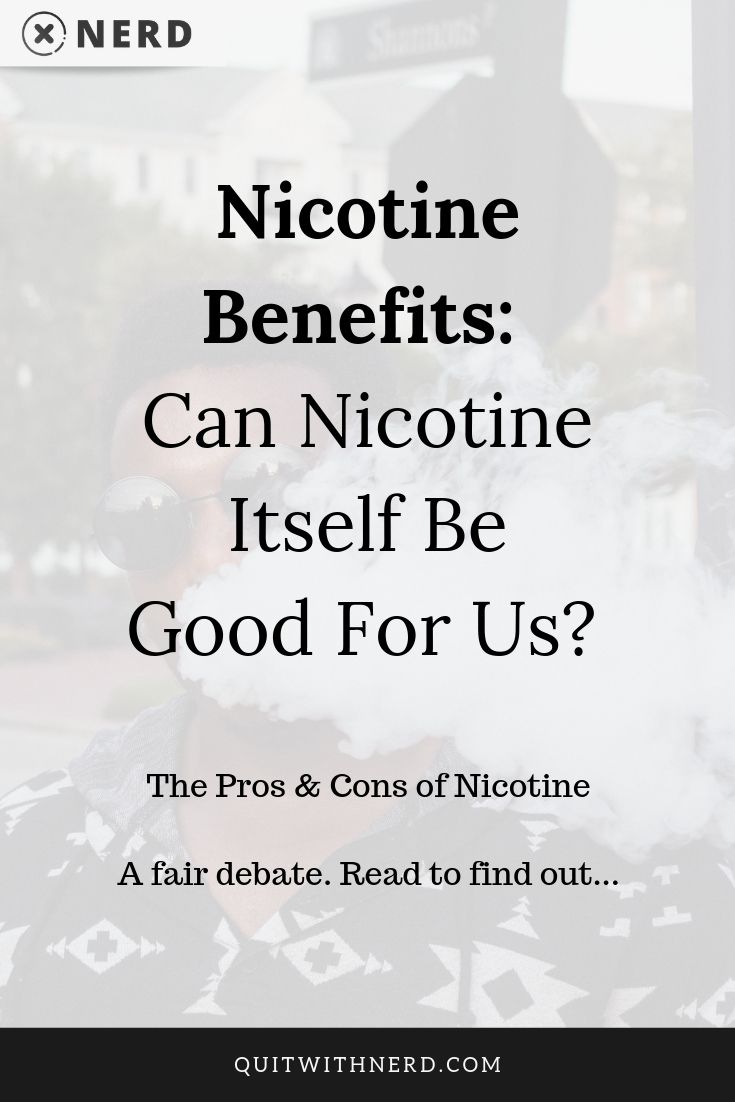
Contents
Let’s Be Clear Before Proceeding
I call nicotine a bully and our enemy because it is what is it.
Whether you like it or not we smoke to relieve nicotine withdrawal
And that’s the truth.
If it is not for this drug, most smokers wouldn’t be smoking, dipping, chewing, or even vaping today.
Here are four points you need to know before diving into the pros and cons.
- Firstly, I write this post NOT to give e-cigarette users (and folks who consumed nicotine products) more reasons to isolate nicotine. There’s more to vaping than meets the eye.
Though it is commonly called vaping… the truth is it doesn’t produce vapor. It produces aerosol. More on this in a future post. Be notified of new posts here.
- Secondly, cigarettes may increase the risk of cancers. However, nicotine is not the same as tobacco hence I separate this post as a standalone.
- Despite my hatred for nicotine, I write this post without prejudice so you can rest assured of the integrity of the points – both the pros and cons – made below.
I write to educate by opening your mind to the truth although the truths may sometimes hurt
You can picky with other posts but NOT WITH THIS which brings me to my final point…
- If you read the pros then be sure to also read the cons in order to have a full understanding and vice versa. Don’t be bias in what you want or choose to know.
With this in mind let’s cut the preamble and get started with the benefits…
The Benefits of Nicotine (PROS)
1. Nicotine Increases Mental Alertness and May Enhance Brain Function
Nicotine enhances our alertness by increasing our heart rate.[efn_note]https://www.medicalnewstoday.com/articles/240820.php[/efn_note] Whenever we smoke or vape, we will feel mentally more alert than before.
Preliminary studies have also shown participants who consume nicotine over a period of six months have a notable increase in attention, memory, and ratings of cognitive impairment.[efn_note]https://www.ncbi.nlm.nih.gov/pmc/articles/PMC3466669/[/efn_note]
The biggest study (involving $9.4 million and 300 individuals) conducted by the director of Vanderbilt University’s Center for Cognitive Medicine, Paul Newhouse to test his hypothesis in regard to the role of nicotine in neurological disorders and here is what he has to say[efn_note]http://news.vumc.org/2015/10/29/study-explores-nicotine-patch-to-treat-memory-loss/[/efn_note]:
- “We tested whether transdermal nicotine patches could help patients who are developing early signs of memory loss that often lead to Alzheimer’s and found that there was significant evidence of improvement in cognitive performance in both attention and memory.”
2. Nicotine May Improve Mood and Decreases Stress
Norepinephrine, serotonin and dopamine increase in the body with nicotine use.[efn_note]https://www.omicsonline.org/smoking-related-changes-in-neurotransmitters-in-african-americans-2155-9821.1000e106.php?aid=2617[/efn_note] This suggests that nicotine could be an effective treatment for depression and anxiety, and may lower stress levels.
Experts are divided on this matter. Some researchers don’t think there is enough evidence to support this claim yet.
However, other scientists see real potential in using nicotine to treat depression and anxiety.
Paul Newhouse states:
“We have a small, open-label, pilot study of nicotine augmentation in older adults with depression, but it’s not linked to dopamine.”
Newhouse believes there is a potential for depression in this group but it is not associated with low dopamine levels.
He asserts “what we think is nicotine alters cortical network activity,” which redirects certain brain networks.
Depressed brains tend to look more “inward” than healthier brains, which explains why people with depression often replay their past mistakes and react to the future with fear.
Nicotine could help these individuals develop a brain that has more “outward” qualities, which could ease anxiety and depression.[efn_note]https://www.ncbi.nlm.nih.gov/pubmed/12151749[/efn_note]
3. Nicotine May Aid in Parkinson’s Disease
According to epidemiological data, smokers are much more likely to suffer from strokes and heart disease and to get cancer.
Nevertheless, smokers are also much less likely to develop Parkinson’s disease.[efn_note]https://www.aan.com/PressRoom/Home/PressRelease/813[/efn_note]
It’s been difficult for researchers to receive funding for human studies concerning nicotine since the substance is so closely associated with smoking.
Researchers have conducted significant studies on other mammals, however, and have seen positive results. These results have led to a human trial currently underway. The trial is funded by the Michael J. Fox Foundation.
Former senior researcher scientist at The Parkinson’s Institute, Maryka Quik states that “over the years, people have tested this idea in mice and rats and monkeys” and that nicotine can indeed shield the body against Parkinson’s disease in the brains of monkeys.
Quik worked on several studies in this area. One of the most well-known research projects revealed that monkeys with dyskinetic or involuntary movements, which are common in Parkinson’s disease[efn_note]https://www.ncbi.nlm.nih.gov/pmc/articles/PMC4430096/[/efn_note] — had a 60 to 70% reduction in movements when given water laced with nicotine.
This may be because nicotine molecules fit into acetylcholine, which is a neurotransmitter. Since nicotine and acetylcholine are a “match,” nicotine may have the capacity to moderate other brain receptors.[efn_note]https://www.ncbi.nlm.nih.gov/pmc/articles/PMC3685410/[/efn_note]
Quik also states:
“In Parkinson’s disease there is a degeneration of neurons, and nicotine has been shown to increase some growth factors in the brain. So it’s possible that nicotine can partially prevent the degeneration that happens in the brain by increasing these growth factors.”
4. Nicotine May Suppress Appetite
Nicotine stimulates us, therefore, it suppresses our appetite.[efn_note]https://www.health.harvard.edu/newsletter_article/study-suggests-how-nicotine-suppresses-appetite[/efn_note]
However, it is also important to note that nicotine also works as a depressant which increases appetite (more on this later, click here to do a quick jump).
Nicotine activates POMC neurons[efn_note]https://www.nature.com/articles/npp2012163[/efn_note], and these neurons activate melanocortin MC4R receptors; this action boosts metabolism to decrease hunger.
Nicotine also reduces inflammation and improves insulin resistance[efn_note]https://www.medpagetoday.com/endocrinology/generalendocrinology/47669[/efn_note], which may lower the chances of obesity.
5. Nicotine May Improve Short and Long-term Memory in Healthy Individuals
Nicotine can be helpful in consolidating the information in our brains and has been proven to improve long-term and short-term memory in animals and humans.[efn_note]https://www.nia.nih.gov/alzheimers/clinical-trials/memory-improvement-through-nicotine-dosing-mind[/efn_note]
This drug may also boost processing time for complex activities and improve overall attention and focus.[efn_note]https://www.webmd.com/smoking-cessation/news/20021023/harnessing-nicotines-power[/efn_note]
This is largely due to the fact that nicotine activates the parietal and occipital cortices to enhance cognitive performance. These sections of the brain are responsible for visual processing and sustained attention.
No healthcare professional can officially recommend nicotine for non-FDA-approved purposes.
As of now, the FDA has only approved the use of nicotine for those who are trying to stop smoking.
Though, there is growing evidence that suggests that nicotine has neurological benefits.
The largest human research studies for nicotine and its potential to improve or prevent Alzheimer’s and Parkinson’s are currently in progress.
The conclusions from these studies could make a huge difference in the way healthcare providers recommend nicotine to patients in the future.
Until then, the jury is out.
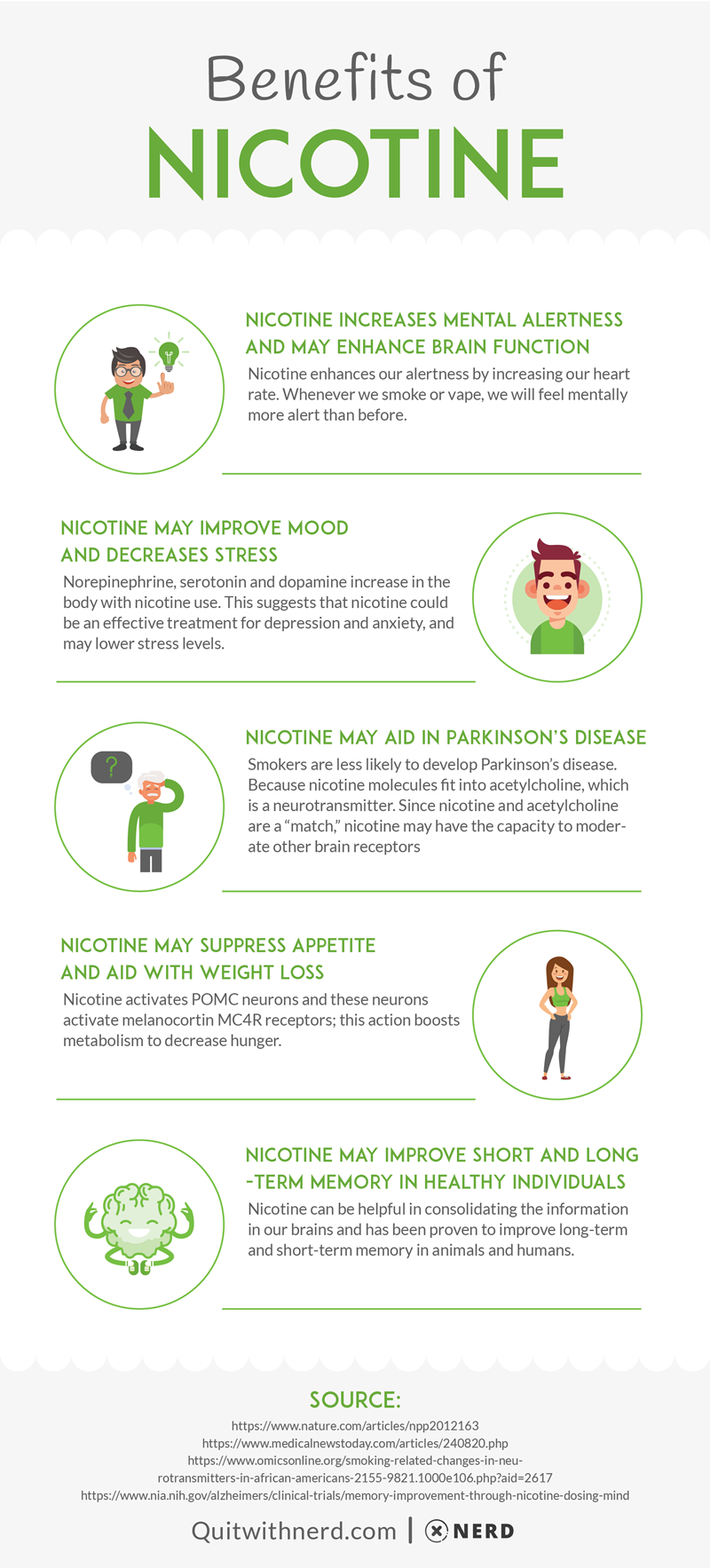
Also Read:
- Debunking 4 Commons Myths of Smoking (FACTS VS MYTHS)
- Best Way to Stop Smoking: Quitting Doesn’t Have to Be Difficult (TIPS)
- Will Life Be Boring or Different After We Quit Smoking? (POSSIBLE)
- Cold Turkey: The Danger of Using Willpower to Quit Smoking (MY STORY)
The Drawbacks of Nicotine (CONS)
1. Nicotine Increases Our Heart Rate and Makes Us Lazier
Nicotine increases our alertness but it does so by increasing our heart rate.[efn_note]https://www.sciencedirect.com/science/article/pii/S0273230014001706[/efn_note] Why is this bad?
This causes us to be mentally more alert but physically more tired.
Every time we smoke we get a small mental reward from the effect of nicotine but a corresponding physical debit which progressively becomes worse over time.
We know that exercise releases positive chemicals in the brain that genuinely makes us happier.[efn_note]https://www.sciencedaily.com/releases/2016/02/160225101241.htm[/efn_note]
However, the opposite is true when we increase our heart rate from nicotine.
When our heart rate gets high through physical exertion, we feel uncomfortable.
This is our body natural way of signaling us to slow down and rest (to avoid stressing the heart to the point of having a heart attack).
The problem with consuming nicotine is it increases our heart rate as if we are exercising thus making us want to rest and relax more often than we should.
This explains why nicotine users tend to be relatively unfit and why heart diseases are commonly linked with this drug
It also shows why we prefer to sit and lay down, relax, put our legs up high whenever we are smoking or vaping.
Nicotine causes us to be lazy and decreases our desire to want to do any real exercises.[efn_note]https://www.ibtimes.co.uk/smokers-lazier-more-prone-depression-anxiety-new-study-1435291[/efn_note]
If you do this simple exercise, more often than not, you’ll experience:
- Before smoking: Irritated or agitated (usually caused by withdrawal)
- Immediately after smoking: Mentally more alert and awake (but not physically)
- After 15 to 20 minutes: Mentally and physically more lazy and tired (sluggish)
2. Nicotine Cause a Chemical Imbalance in Our Brain
Our brain is complicated in such that it will balance or counterbalance its own chemicals, drugs, and hormones.
To put it simply, there are two different effects to nicotine[efn_note]https://counselorssoapbox.com/2012/08/04/is-nicotine-a-stimulant-or-a-depressant/[/efn_note]:
- Stimulants: Makes us feel more alert and mentally prepared
- Depressants: Makes us feel more relax and calm
Many companies who promote the use of nicotine emphasize the former and fail to provide enough the latter.
We have to look at both sides of the same coin in order to understand the true effects of this drug.
Every time we consume nicotine, we will feel notably more alert and awake (stimulants).
The issue here is our brain recognizes that we are overstimulated so it counters by reducing the amount of naturally occurring stimulants in our system and increases depressants.
When this happens, the effect of nicotine wears off and we will feel much less alert than before we smoked it.
But because our natural occurring stimulants are now low, we need another boost of nicotine to get us back to optimal levels.[efn_note]https://www.swedish.org/classes-and-resources/smoking-cessation/nicotine-dependence-how-it-happens[/efn_note]
So the next intake will no doubt make us feel more awake but we are actually no better than we would be had we not consume the nicotine in the first place.
This is dangerous because it causes us to be more reliant on an artificial boost and more dependant on nicotine to ‘make’ our day.
A life that is constantly dependant on an artificial boost to make our day is not the most ideal of lifestyle
The moment when nicotine starts to wear off – causing a chemical imbalance in our brain – is when nicotine withdrawal occurs which I will further explain next…
3. The Constant Nagging of Nicotine Withdrawal
Nicotine withdrawal may be complex but I will do my best to explain it in layman terms.
With that, I going to seize this opportunity to use graphs to highlight my points so that you can have a better understanding of it without all the rah-rah.
Let’s deep a little deeper into stimulants and depressants to have a clearer picture.
Graph #1: When stimulants and depressants are close to equal it shows that we are feeling good emotionally and mentally. Therefore, making us generally quite happy.
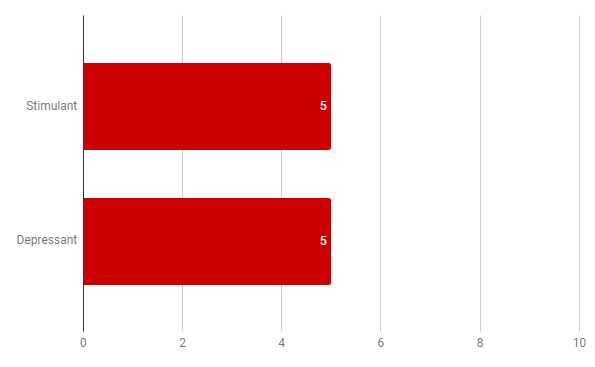
Graph #2: Nicotine has a stimulating effect so when we consume it, it leaves us feeling more awake and mentally more alert (but as mentioned in the previous con, it also leaves us physically more exhausted).
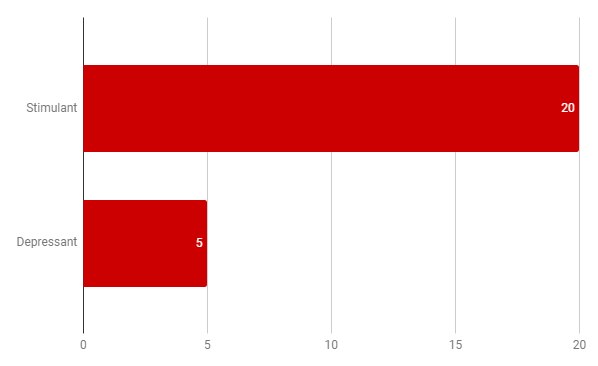
Graph #3: As mentioned, our brain has its own unique way to balance or counterbalance hormones, chemicals, and drugs. The overstimulation means the brain will decrease naturally occurring stimulants in our system and increase the depressant side of the scale (see below).
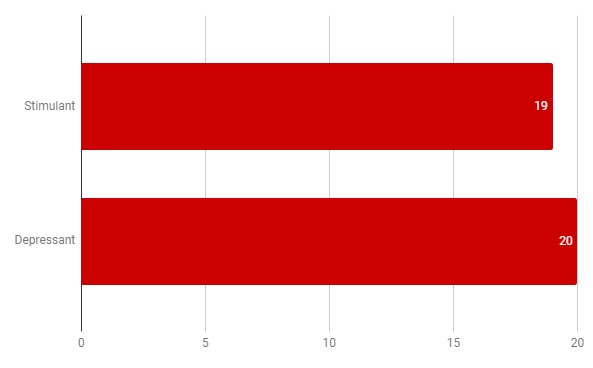
Graph #4: The effects of nicotine will wear off slowly and now the brain is suddenly understimulated. This causes an imbalance (and is what we commonly interpret as withdrawal).
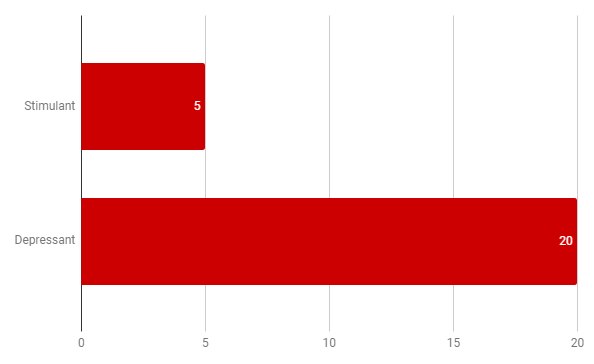
Graph #5: The easiest and fastest way to counter this imbalance is to take another dose of nicotine which will then spike the stimulant level up. This remedy the chemical imbalance caused by the previous cigarette (albeit only temporary) and is the start of the addiction cycle.
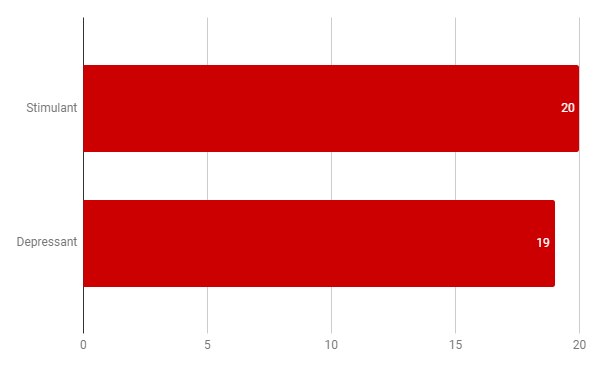
Though withdrawal is mild; it creates a feeling of nervousness, and wary.[efn_note]https://www.pnas.org/content/104/46/17901[/efn_note]
Imagine having to go through this cycle all day, every day just to garner the feeling of being a non-smoker. This is not a real pleasure.
we have to understand that nicotine does absolutely nothing for us
As you can see, consuming nicotine to relieve withdrawal is a counterfeit pleasure.
This is the reason why I call nicotine a bully and our enemy because he keeps lying to us that he is the real thing when the truth is he is just an imitation.
If people enjoy being toy around by nicotine, let them be but don't fall for the marketing trap that nicotine is 'healthy;' It is not! Click To TweetNicotine is a liar and he literally fucks with our minds
4. Nicotine Impacts Our Sleep in a Very Insidious Manner
Simply closing our eyes and being unconscious doesn’t equal to a night of good quality sleep.
Good quality sleep involves going through various cycles that involve deep sleep, REM (Rapid Eye Movement), etc.[efn_note]https://www.emedicinehealth.com/sleep_understanding_the_basics/article_em.htm[/efn_note]
The fact that nicotine causes an imbalance in our mind makes it harder and way more difficult for smokers to fall asleep (and to sleep deeper) compared to non-smokers.
- Studies have been proven over and over that smokers find it way more challenging to fall asleep[efn_note]https://www.sciencedaily.com/releases/2008/02/080204172250.htm[/efn_note]
- It is also true that people who consume nicotine has difficulties cycling down to the deeper stages of sleep[efn_note]https://academic.oup.com/ntr/article-abstract/18/12/2252/2858126[/efn_note]
This is because nicotine is still coursing through our veins when we go to bed.
Though nicotine is a fast-acting drug, our body still needs hours to eliminate most of the drug from our system.
This proves why in tests smokers show significantly less time spent in the crucial REM sleep stage than non-smokers
Obstructive Sleep Apnea (OSA) Simplified
When we sleep we naturally relax our throat soft tissues and muscles.
However, for some people, this can cause a partial or total blockage of the airway making it hard for oxygen to reach the brain.
When this happens the lack of oxygen triggers our brain to pull us out of deep sleep so that our airway reopens and we can breathe normally again.[efn_note]https://www.sleepresolutions.com/blog/smoking-and-sleep-apnea[/efn_note]
This condition is known as apnoea.
Smoking and vaping irritate the lining of the nasal cavity thus causing swelling and excess mucus to form in our passage.[efn_note]https://www.soundsleephealth.com/blog/is-vaping-a-better-option-than-smoking-at-bedtime[/efn_note]
Because of this, it makes it harder to breathe through our nose. This has a tremendous impact on its own and it will make us far more prone to apnoea.
This condition has a huge effect on our lives because it impacted our sleep without even us even knowing. And we know that the lack of sleep can have devastating effects in all areas of our lives.
For more information on apnoea and how nicotine affects sleep, read:
- How Nicotine Affects Sleep
- Is vaping a better option than smoking at bedtime?
- Nicotine, Smoking and Sleep Apnea
5. Nicotine Causes Us to Overeat and is One of the Primary Causes of Obesity
To understand the contradiction of how nicotine suppresses our appetite and how it is one of the primary causes of obesity we have to once again return to the effects of stimulants and depressants.
Stimulants Suppress Hunger
To put it simply, stimulants have a tendency to trigger our fight or flight response.[efn_note]https://science.howstuffworks.com/nicotine2.htm[/efn_note]
The effect of stimulant causes us to be more awake and it increases our alertness
This explains why nicotine may suppress our hunger at the initial stage.
When we encounter danger (the trigger of fight or flight response) the last thing we need is to sit down, relax and enjoy a large meal.
This effect removes our appetite because of the fact that digestion takes up a lot of energy. It is why we tend to feel more sleepy and tired after having a large meal.
This is the reason we often hear smokers talk about how smoking, dipping, or vaping suppress their hunger.
But…
The truth is, stimulant suppresses hunger; not smoking
Unfortunately, when it comes to drugs, there is more to the initial effect than meets the eye.
This, of course, brings us to…
Depressants Make Us Hungry
Depressants cause us to be more sleepy and feel more relaxed.
However, this also causes us to feel hungry because, after all, the best time to eat, recuperate and recovery is when we are truly relaxed.
This explains why smokers can go without eating whenever they chain smoke and then suddenly realized they are famished once the nicotine spree is over (when withdrawal kicks in).[efn_note]https://www.ncbi.nlm.nih.gov/pubmed/1738793[/efn_note]
Unless you are planning to chain smoker all day, every day, chances are you will eat more than if you weren’t smoking at all
Debunking the Myth that Smoking Helps Us Lose Weight
When we are not smoking or vaping we are hungrier due to the lack of stimulants (withdrawal period) and when we smoke or vape our stimulants rise up resulting in decreased appetite (relief withdrawal).
This gives us the perception that smoking helps to lose weight.
The truth is, we will only feel hungrier during the brief withdrawal period.
If you are interested in the timeline, check out this infographic:

As you can see, our body will recuperate to normal sooner than you think. Once we are back to normal, hunger pangs will cease to exist.
In just 72 hours, we are 100% nicotine-free.[efn_note]https://challenges.openideo.com/challenge/end-of-life/ideas/quit-smoking-timeline[/efn_note]
This period of readjustment is when the brain recognizes that there is no artificial stimulation provided by nicotine and will get back to releasing its own natural stimulants like it did before we started smoking.
Once this occurs, we will start to feel much less lazy, more confidence and more resilient.
When nicotine is no longer in play, there will be no need to smoke, vape, chew, dip or whatever to 'suppress' our hunger. Click To TweetInstead of giving nicotine the credit for everything and the blame for nothing, we should start asking ourselves who is the main culprit in the first place.
Seriously, let’s be honest and ask ourselves who is one that causes all the undue spikes and emotional roller-coasters when we were perfectly fine without this drug in the first place.
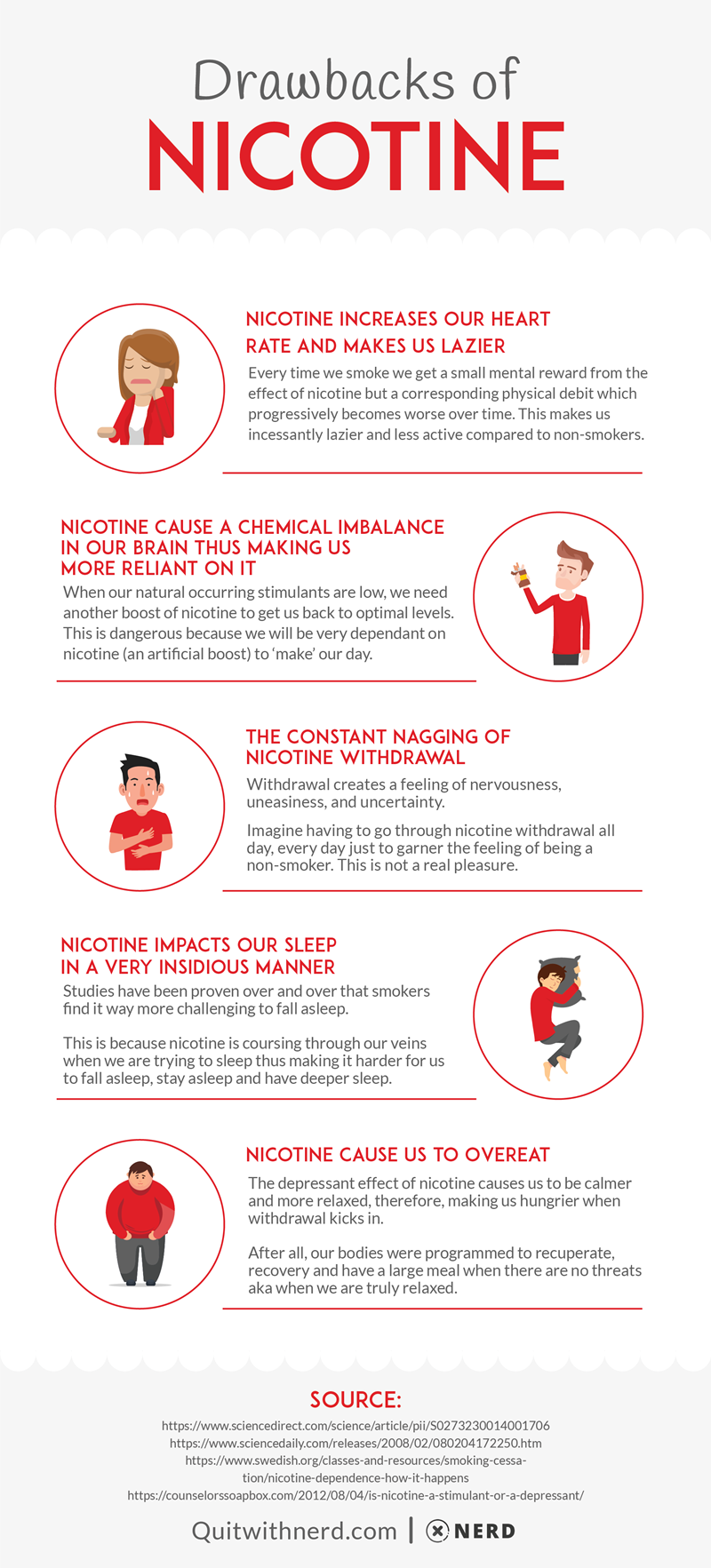
Also read:
- Debunking the 4 Commons Myths of Smoking
- 101 Reasons to Quit: Why You Should Stop Smoking Today
- 5 Reasons Why Smokers Find it Hard to Quit Smoking
In Summary
This is a fair debate.
Be sure to read both the pros and cons to have a clearer understanding of how nicotine works.
Here’s an example (a short one) just in case you choose not to read the cons.
Nicotine increases our mental alertness by increasing our heart rate
The result of this is we feel mentally more alert but physically more tired. This can be detrimental to our overall wellbeing.
We can safely say that vaping (or nicotine patches, gums) is healthier than smoking because of combustion and the many chemicals contained in tobacco cigarettes.
It is okay to tell people that vaping is healthier than smoking
That I can totally accept but what I truly cannot accept is we tell people:
- Vaping is ‘healthy’ or
- Nicotine is ‘healthy’
Not healthier – mind you – it is healthy. This is an absolute abomination.
Just because we enjoy doing something or there’s money to be made doesn’t give us the right to mislead others to such an extent.
The result of this propaganda has caused many people who aren’t smoking combustible cigarettes to take up e-cigarettes because they believed in the fucking lie that this is ‘healthy.’
E-cigarettes were created as a smoke cessation aid. let it be that and nothing more.
The fact is our body will do just fine (in fact, much better) without the constant intake of nicotine.
Just because something is safer doesn't mean it is safe. Click To TweetMore Is Not Better
The truth is even truly healthy things we know we should do more of like drinking more water or eating more apples can be bad for us if we consumed too much.[efn_note]https://www.theglobeandmail.com/life/health-and-fitness/ask-a-health-expert/i-love-apples-can-i-eat-too-many/article584916/[/efn_note]
What’s more a drug like nicotine is so controversial, there are so many studies yet to be done.
We know a lot about the negative impacts of nicotine and so little about the benefits of it.
Let’s not force so much of our attention to trying to prove a bad thing to be good just because we enjoy it or because there’s a profit to be made.
Sure, we may incorporate nicotine in clinical uses in the future but we absolutely cannot categorize it as ‘healthy.’
It is like saying antibodies are healthy; they are not healthy though they are often used and prescribed in health establishments.
Even if the results of nicotine were to come up with more positives than negatives (which is extremely unlikely), I’m here to remind you that more isn’t better.
Here is What We Should Do
Stop giving nicotine the credit for everything and the blame for nothing
The fact is nicotine is a counterfeit and imitation. Stop promoting like this is the real thing.
Yes, it may toy around with our stimulants and depressants level thus giving us a temporary ‘fake’ boost.
I don’t know about you but I would rather have nothing on me than to have a fake Rolex or Gucci. I believe you would too.
You can translate that to:
I would rather feel sad or depress than to have ‘fake’ artificial happiness. At least, when I’m unhappy I can make better choices to fix the real problems in life.
This is infinitely better than living in a world of Teletubbies.
Life is not all rainbows and sunshine
And I’m absolutely fine with it.
My hope is for you to live a life that works on your rules and terms and not being dominated by this stinky substance every 30 minutes.
The truth is having fake things in life is rarely so straightforward. It will expose us and do us more harm than it does us good.
The Nature of Nicotine
I have spent hours burning the midnight oil studying the facts and the nature of nicotine. I can say without a shadow of a doubt that:
Nicotine is the gateway drug and the root of all addictions
NOT marijuana like many perceived it to be.
I don’t know about your circle of friends but ALL of my friends who have a drinking problem are also addicted to nicotine.
And I have yet to meet a cocaine or heroin addict who isn’t concurrently consuming nicotine in one form or another.
Though nicotine has several benefits, it is important to know that:
- Most of the clinical benefits are only beneficial to people who are diagnosed with certain medical issues.
- Many studies were done on animals rather than on humans, therefore, the positive effects may or may not work on humans.
- Nicotine is both a stimulant and a depressant so for every good thing there’s an opposite effect.
- The fact remains that we can thrive better without the artificial boost of nicotine.
Nicotine affects our fitness by causing us to feel heavy and lazy. It speeds up our heart rate giving us a temporary fake boost that results in us feeling more tired physically.
this is just the bloody nature of nicotine
This basic dynamic remains regardless if we vape, dip, chew, smoke, use patches and/or gums.
Do you know nicotine is used as an insecticide to kill living things? Click To TweetNevertheless, the doses are low enough so it doesn’t kill us immediately. Rather, it kills us slowly and insidiously.
However, I can’t argue that certain methods of taking it are less damaging than others. Check out the best to worst below:
Best Ways to Consume Nicotine (From Best to Worst):
- Nicotine mouth spray
- Nicotine lozenges
- Nicotine inhaler
- Nicotine patches
- Nicotine gum
- E-cigarettes/vaping
- Chewing tobacco
- Smoking traditional cigarettes, roll-ups, cigars
Conclusion
My wish is for you to break free from the constant nagging of nicotine withdrawal so you don’t have to serve this stinky substance every 30 minutes or so during your waking hours.
Your loved ones (and people you are closed to) will no doubt benefit from you living a better life.
Give yourself and this irritating nerd (yours truly) a chance and I’m sure in due time we, together, can annihilate nicotine completely.
I know a lot about our enemy and his tactics.
Earlier, I had declared war with nicotine (here) so now I’m cordially inviting you to join me in the battle to fight this bully together.
Finally, I am going to end here by asking you to share this post with your loved ones who are currently using and/or promoting nicotine.
I hope I have been of service.
Keep in touch.
Sincerely,
Jeremiah Say

